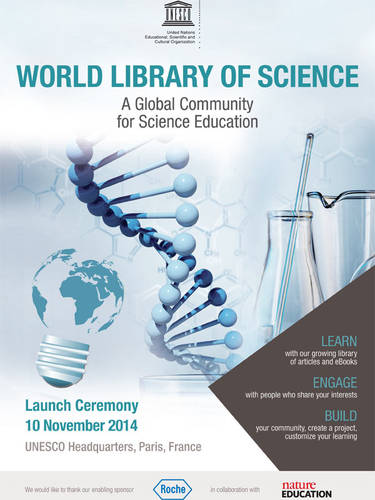Source: Human Wrongs Watch
The UN Educational, Scientific and Cultural Organization (UNESCO) has launched the UNESCO World Library of Science (WLoS), a newly created, free online science education resource for a global community of users.
Developed through the joint efforts of UNESCO, Nature Education and Roche, the WLoS was created to give students around the world, especially those in disadvantaged regions, access to the latest science information as well as the opportunity to share their experiences and learning through discussion with their peers in a shared learning environment.*
Launched on 10 November 2014 on the occasion of World Science Day for Peace and Development 2014 the WLoS is a science resource library stocked with over 300 top-quality articles, 25 eBooks, and over 70 videos from the publishers of Nature, the most cited scientific journal in the world. It is also a state-of-the-art digital platform that provides a community hub for learning.
Users can join classes, build groups and connect with other learners.
Specifically, the WLoS seeks to make science learning accessible to students everywhere in the world by:
· Helping equalize learning opportunities. The WLoS is open to all at no cost. It provides students with access to high-quality educational material, regardless of geography or economic circumstances. UNESCO will dedicate special attention to training teachers and students in least developed countries in how to use the WLoS, accelerating science learning in disadvantaged regions.
· Improving the quality of teaching and learning. The WLoS supports teachers and students worldwide by giving educators concrete ideas about how to present complex scientific concepts and students resources to fuel and complement their learning. The website provides a searchable database of content that is peer-reviewed.
· Strengthening science education. Scientific understanding is the foundation of sustainable development and prepares learners for employment.
· Promoting the use of open educational resources. The WLoS content is open. It can be tailored and shared for any educational or non-commercial use. The WLoS is founded on the idea that educational content and scientific knowledge should be free and accessible to all.
· Connecting communities of students and teachers. The WLoS is more than just a traditional library: it is a dynamic resource that allows users to collaborate with others, personalize their learning experience, pose and answer questions, and collaborate with others while exploring scientific concepts. The WLoS fosters knowledge-sharing and peer-learning.
“The world needs more science and more scientists to face today’s global challenges, ” said UNESCO Director-General Irina Bokova.
“Achieving this requires better and more accessible science education. The UNESCO World Library of Science is a remarkable and exciting new tool that will help provide it, not only to students, but also to education planners and teachers, wherever they may be.”
“Science is the engine of human prosperity”
Mariette DiChristina, Executive Editor, Nature Publishing Group and Editor-in-Chief of Scientific American, added:
“Science is the engine of human prosperity that powers and enables a better future for us all. That is why it is so important to widen access to high-quality information about science and to science teaching, and why we are tremendously proud to be involved in this effort to open up high-quality content from Nature, the world’s leading science journal, and other quality sources. As we continue to add to the UNESCO World Library of Science over time, we will help share scientific knowledge and the wonder of discovery with students and teachers all over the world.”
Dr. John C. Reed, Head of Roche Pharma Research and Early Development, said:
“As a research-focused company, we are firmly committed to promoting excellence in science across the world. The UNESCO World Library of Science is an excellent platform to enable future generations of scientists, particularly those in disadvantaged regions of the world, to have access to the latest science information and educational resources. This is why we proudly support the project as Enabling Sponsor.” (*Source: UNESCO release. Get more information here).


